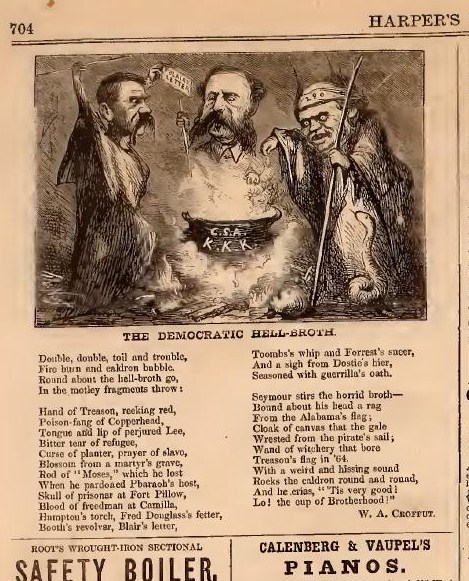Democratic politician John Dix was a Union general during the Civil War and in 1868 was serving as American Minister to France. In early September he sent a letter to friend in New York City. Mr. Dix wanted to deny a report in an American newspaper that he supported Democrat presidential nominee Horatio Seymour. In its September 23, 1868 issue The New-York Times published the letter with an introduction explaining that “It was not written for publication, but the gentleman to whom it was addressed has consented to give it to the public.” John Dix said Mr. Seymour was a nice guy, “But you know as well I that he has not a single qualification for the successful execution of the high official trust to which he been nominated, and he is especially deficient in that firmness of purpose which in critical emergencies is the only safeguard against public disorder and calamity.” On the other hand, the election of Ulysses S. Grant would ensure the country’s safety in dangerous times. “On his decision of character, good sense, moderation and disinterested patriotism, I believe the South will have a far better hope of regaining the position in the Union to which it is entitled” than under a Seymour administration.
A couple weeks later a pro-republican newspaper responded to Democrat charges that the letter was just sour grapes – that John Dix was miffed that he was not nominated by the Democrats.
From Harper’s Weekly October 10, 1868:GENERAL DIX FOR GENERAL GRANT.
The letter of General DIX strongly advocating the election of General GRANT, and stating his reasons for opposing Mr. SEYMOUR, is not only very good in itself, but it is very significant. The SEYMOUR papers sneer at it as the snarl of a disappointed man. But that does not touch the point. Granting it to be so, for the argument, what then? Why is he disappointed? Certainly General DIX’s career as a Democrat is much more conspicuous and brilliant than Mr. SEYMOUR’s. He has been Senator in Congress, secretary of the Treasury, and Minister to France. He is a gentleman of capacity, of scholarly accomplishment, of very great experience in public affairs, of unspotted reputation, and of national distinction. It is said that he disappointed because he was not nominated by the Democrats for the Presidency. Very well, being a much more eminent and able man than Mr. Seymour, and universally known to his party, why was he not nominated?
For precisely the same reason that he was not confirmed as Minister to France twenty years ago, when his party controlled the Senate and the policy of the Government. Because he was not a tool of the aristocratic slave power; because he had been opposed to the annexation of Texas for the benefit of that power; and because he had said that slavery should be confined to its domain by a cordon of free States, and forced, like the scorpion girt with fire, to sting itself to death. General Dix, although a Democrat, had shown some emotion of humanity, some sense of justice, some regard for national honor. But from the moment that this appeared his ” Democracy” was not sound. “Sound Democracy” was unswerving subservience to the slave-holding aristocracy. FRANKLIN PIERCE’S was the true article; so was HORATIO SEYMOUR’S. They sneezed when Senator BUTLER of South Carolina took snuff.
When the slaveholders rose in rebellion against the Government, “sound Democracy” was shown in the letter of PIERCE to JEFFERSON DAVIS and the speeches of SEYMOUR, denouncing the war and discrediting the Government. But General DIX surrendered all hope preferment by the Democratic party when he wrote, “If any man haul down the American flag, shoot him on the spot!” What was WADE HAMPTON doing but that very thing? What was HORATIO SEYMOUR doing but encouraging him? And when both were baffled, and WADE HAMPTON returned to the command of the Democratic party, of course he rewards SEYMOUR, and General DIX has as much chance of the nomination as CHARLES SUMNER.
If, then, General DIX be a disappointed man, it is because he has not understood his party. What right had he to suppose, from any thing the Democratic party has ever said or done, that hostility to slavery and distinguished service for the Government against the rebellion were claims upon its favor? Who were the managers of that party during the war? Who was the President of its National Convention in 1864,and what did that Convention declare ? Who controlled its late Convention? VALLANDIGHAM directed its financial policy, and WADE HAMPTON its policy of reconstruction. It nominated HORATIO SEYMOUR, who declared that the success of the Government would be as revolutionary as that of the rebellion, and FRANK BLAIR, who called aloud for the President to overthrow by force the governments of the Southern States. “Sound Democracy” served slavery alive, and it serves it dead. It passes black codes, organizes the Ku-Klux Klan, and threatens laborers with starvation who do not support it. It is the enemy of equal rights, of free government, and of progress. Its chosen representatives are SEYMOUR, VALLANDIGHAM, HAMPTON, and HOWELL COBB. Is General DIX disappointed that these persons did not nominate him, or that his party insists upon being chained to a corpse?
The next week Harper’s editorialized about another Democrat ex-Union general, who had recently returned from Europe. George B. McClellan’s take on the presidential election was basically “no comment.” Mr. McClellan might have been mostly disappointing as a general, but that wasn’t really his fault. His big mistake was accepting the Democratic nomination for president in 1864:GENERAL M’CLELLAN has returned from Europe, and there has been a torch-light procession in his honor, which was probably not all that its projectors had anticipated. The General did not declare himself. He did not even name SEYMOUR nor hurrah for Blair. He merely said “Thank you, gentlemen,” bowed, and retired. As usual, he was in a false position. There is something touching [?] in the continued determination of some interested persons to make the General a great or representative man. There was, indeed, a time when the need of a great military leader was felt to be so urgent that, will he nill he, the country insisted the General was he. He was the little NAPOLEON. General SCOTT had expressed complimentary opinions, and the fight in West Virginia showed that the great man was coming. The General went to Philadelphia and received a sword, and said, modestly, that the war was to be short, sharp, and decisive. And all the while those wretched Quaker guns were making mouths at him from Manassas. It was no fault of the General’s that the country was deceived. But it is sad to think of the Chickahominy swamps, and it is even ludicrous, now that the facts are becoming known, to recur to that history. If, after tha[t] terrible seven days, and the unopposed withdrawal of Lee from Antietam, General M’CLELLAN had quietly disappeared from public view, there would have been an irresistibly tragi-comical, but not a very hostile feeling in regard to him, and the final verdict would have been that we were ourselves most to blame in insisting that any man was great merely because we wanted a great man.
The serious error of General M’CLELLAN was accepting the candidacy of the party that demanded the triumph of this rebellion. He then deliberately became the representative of the Copperhead spirit of the country. It was the result of conviction or of sheer weakness. …
Other Union generals did favor the Democratic ticket. According to a report in the October 31, 1868 issue of The New-York Times the night before a rally of “Blue Democrats” was held at Tammany Hall. The report said the meeting of “true War Democrats, “those who believed the war a failure until the final triumph came,” was fairly well attended, but some of the generals “advertised” to be there, including W.S. Hancock and W.S. Smith didn’t show up. Someone read a letter from George McClellan explaining he couldn’t return to New York but was thankful for the invitation and wished the meeting and the Democratic cause all the best. It appears that the main speaker was General Frank P. Blair, Jr. – the Democrat candidate for Vice-President.


![Gen. John A. Dix (Hartford, Conn. : Taylor & Huntington, No. 2 State St., [between 1861 and 1865]; LOC: https://www.loc.gov/item/2011661066/)](https://www.bluegrayreview.com/wp-content/uploads/2018/10/1s02844v-300x175.jpg)
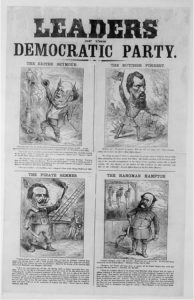
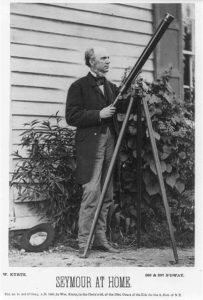
![[Major General George B. McClellan in uniform] / Cartes de visite by Silsbee, Case & Co., photographic artists ; Case & Getchell from Dec. 3, 1862. (LOC: https://www.loc.gov/item/2016649613/)](https://www.bluegrayreview.com/wp-content/uploads/2018/10/41848v-186x300.jpg)
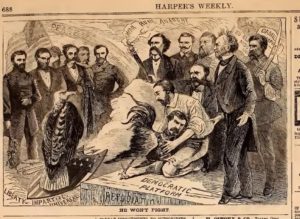

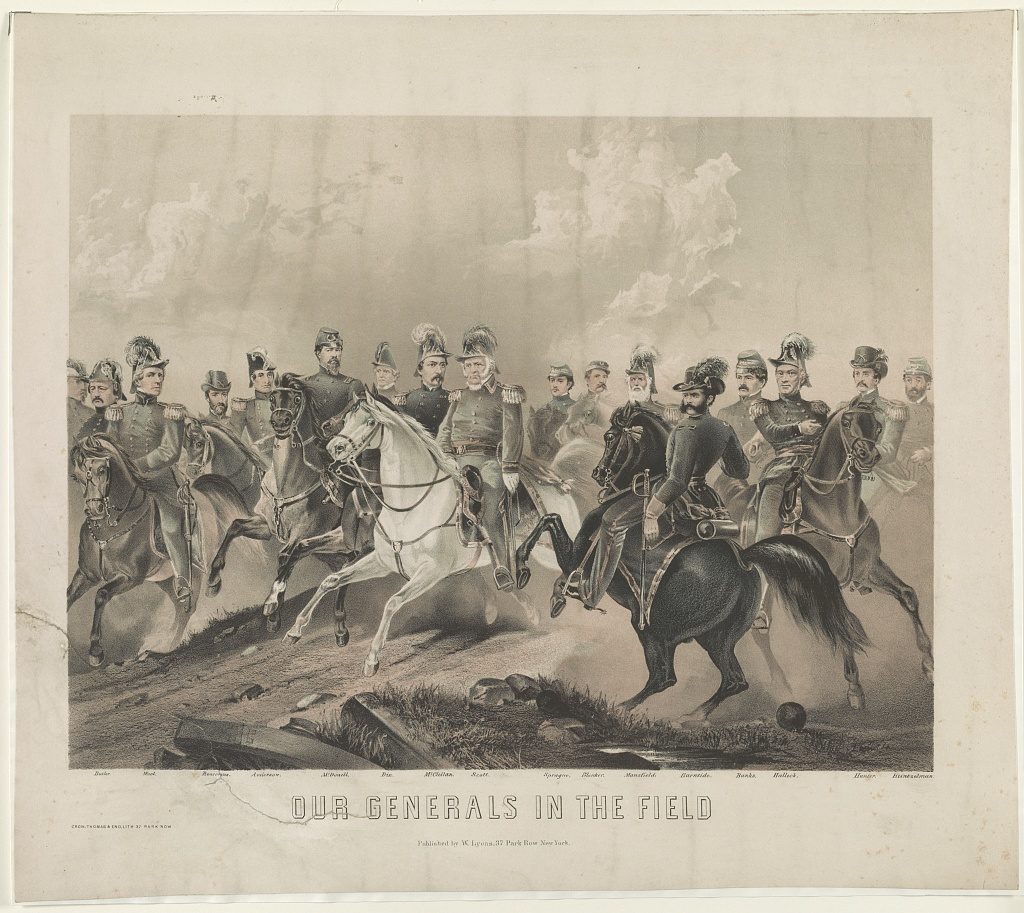
![Gen. John A. Dix (Hartford, Conn. : Taylor & Huntington, No. 2 State St., [between 1861 and 1865] ; LOC: https://www.loc.gov/item/2011661066/)](https://www.bluegrayreview.com/wp-content/uploads/2018/10/2s02844v-180x300.jpg)
![[Gen. U.S. Grant campaign button for 1868 presidential election] (1868; LOC: https://www.loc.gov/item/2011661490/)](https://www.bluegrayreview.com/wp-content/uploads/2018/10/32108v-300x300.jpg)
